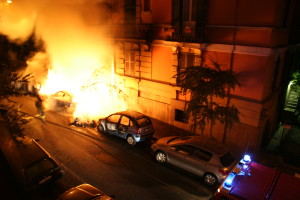18.2-82 Burning Building/Structure while Intending to Commit Felony
July 21, 2015 by Jean Humbrecht


This post is part of a series discussing different Fairfax arson charges. This article focuses on Va. Code §18.2-82, Burning a Building while Intending to Commit a Felony.
There are three other Fairfax arson charges that focus on buildings. §18.2-77 criminalizes the malicious burning of a dwelling house. §18.2-79 criminalizes the malicious burning of a meeting place. §18.2-80 criminalizes the malicious burning of any other structure not covered in the other arson statutes. The difference between §18.2-82 and the other Fairfax arson charges is that someone can be convicted under §18.2-82 even if he did not act with malice.
For more information on Fairfax arson charges involving a dwelling house, click here.
For more information on Fairfax arson charges relating to a meeting place, click here.
For more information on Fairfax arson charges involving any other buildings, click here.
The Statute
Va. Code §18.2-82 states:
“If any person while in any building or other structure unlawfully, with intent to commit a felony therein, shall burn or cause to be burned, in whole or in part, such building or other structure, the burning of which is not punishable under any other section of this chapter, he shall be guilty of a Class 4 felony.”
Proof of Arson Under §18.2-82
Incendiary Act
The building or structure must be actually burned. Even a slight burning is enough to convict on Fairfax arson charges.
Mental State
The difference between §18.2-82 and the other Fairfax arson charges is the mental state requirement. Malice is not necessary to convict under this charge. If the offender was in the building unlawfully and negligently or carelessly caused the burning, he can be convicted.
Unlawfully in Building
To be found guilty of this Fairfax arson charge, the offender must be in the building unlawfully. This means that he must be a trespasser. The Commonwealth must also prove that the offender intended to commit a felony in the building.
Intending to Commit a Felony
The Commonwealth must also prove that the offender was intending to commit a felony while he was unlawfully in the building. Burglary would be an example of the underlying felony that the accused allegedly attempted to commit.
Punishment
This arson charge is a Class 4 felony. It is punished by 2-10 years in prison and a fine up to $100,000.
Other Fairfax Arson Charges
§18.2-77 prohibits the malicious burning or destruction of a dwelling house. This Fairfax arson charge is punished by up to life in prison and a fine up to $100,000. For more information on this Fairfax arson charge, click here.
§18.2-79 punishes the intentional burning or destruction of a meeting house. For more information on this Fairfax arson charge, click here.
§18.2-80 discusses malicious burning or destruction of any structure not covered in any of the other arson statutes. It is punished by up to 20 years in prison and a fine up to $100,000. For more information on this arson charge, click here.
§18.2-81 is Fairfax arson charge related to personal property. If the property destroyed was more than $200 in value, it is a Class 4 felony. If the damage was less, it is a Class 1 misdemeanor. For more information on this Fairfax arson charge, click here.
§18.2-86 prohibits maliciously setting fire to anything capable of spreading fire on land. This Fairfax arson charge is punished by 1-5 years in prison. It can also be punished by 12 months in jail, a fine up to $2500, or both. Click here for more information on this Fairfax arson charge.
§18.2-87 prohibits allowing a fire to escape the land of another. This Fairfax arson charge is a Class 1 misdemeanor. It is punished by up to 12 months in jail, a fine up to $2500, or both. More information on this Fairfax arson charge can be found here.
§18.2-88 prohibits carelessly damaging property by fire. This Fairfax arson charge is a Class 4 misdemeanor. The punishment for this charge is a fine up to $250.
***DISCLAIMER: THE MATERIAL AND INFORMATION CONTAINED IN THIS POST, ON ANY PAGES ON THIS WEBSITE, AND ON ANY PAGES LINKED FROM THESE PAGES, ARE FOR GENERAL INFORMATION ONLY AND NOT LEGAL ADVICE. YOU SHOULD CONSULT A LICENSED ATTORNEY IN YOUR JURISDICTION BEFORE RELYING ON ANY OF THE INFORMATION CONTAINED ON THESE PAGES. SENDING EMAIL TO OR VIEWING INFORMATION FROM THIS WEBSITE DOES NOT CREATE AN ATTORNEY-CLIENT RELATIONSHIP***





